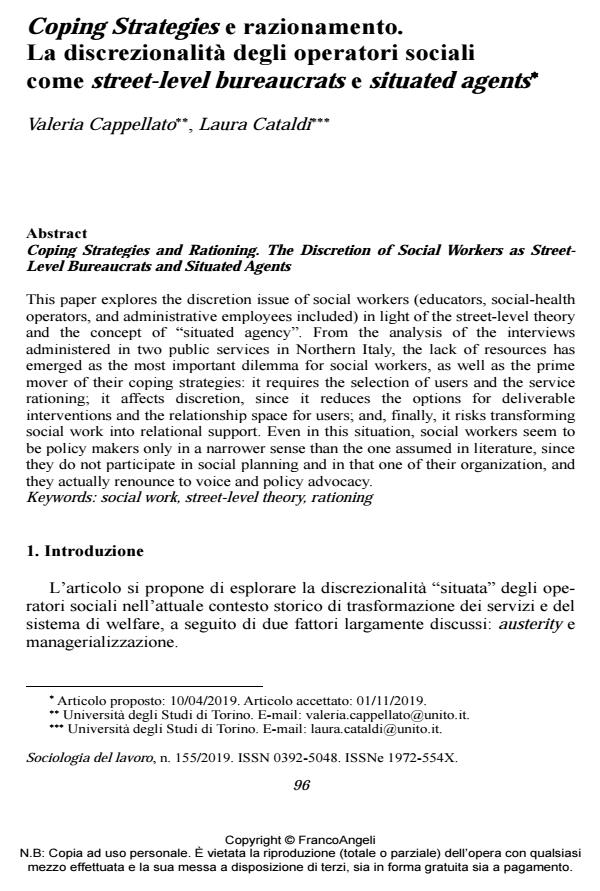Coping Strategies e razionamento. La discrezionalità degli operatori sociali come street-level bureaucrats e situated agents
Titolo Rivista SOCIOLOGIA DEL LAVORO
Autori/Curatori Valeria Cappellato, Laura Cataldi
Anno di pubblicazione 2019 Fascicolo 2019/155
Lingua Italiano Numero pagine 24 P. 96-119 Dimensione file 283 KB
DOI 10.3280/SL2019-155005
Il DOI è il codice a barre della proprietà intellettuale: per saperne di più
clicca qui
Qui sotto puoi vedere in anteprima la prima pagina di questo articolo.
Se questo articolo ti interessa, lo puoi acquistare (e scaricare in formato pdf) seguendo le facili indicazioni per acquistare il download credit. Acquista Download Credits per scaricare questo Articolo in formato PDF

FrancoAngeli è membro della Publishers International Linking Association, Inc (PILA)associazione indipendente e non profit per facilitare (attraverso i servizi tecnologici implementati da CrossRef.org) l’accesso degli studiosi ai contenuti digitali nelle pubblicazioni professionali e scientifiche
L’articolo esplora la discrezionalità degli operatori sociali (assistenti sociali, educatori, OSS e amministrativi) alla luce della street-level theory e del concetto di situated agency. Dall’analisi delle interviste somministrate in due servizi del Nord Italia emerge come la carenza di risorse rappresenti per gli operatori il più rilevante elemento dilemmatico, nonché il motore primo delle loro coping strategies: essa rende necessaria la selezione degli utenti e il razionamento; incide sulla discrezionalità, poiché riduce le opzioni di interventi erogabili e lo spazio di relazione con gli utenti; e, infine, rischia di trasformare il lavoro sociale in supporto relazionale. Anche in questa situazione, gli operatori sociali sembrano essere policy makers solo in un senso più ristretto rispetto a quello attribuito in letteratura, poiché non partecipano alla programmazione sociale e a quella del proprio servizio, rinunciando di fatto alla voice e all’advocacy politica.
Parole chiave:Lavoro sociale, street-level theory, razionamento
- Rappresentazioni e identità degli operatori sociali come street-level bureaucrats e situated agents Laura Cataldi, Valeria Cappellato, in SOCIOLOGIA E RICERCA SOCIALE 121/2020 pp.90
DOI: 10.3280/SR2020-121005
Valeria Cappellato, Laura Cataldi, Coping Strategies e razionamento. La discrezionalità degli operatori sociali come street-level bureaucrats e situated agents in "SOCIOLOGIA DEL LAVORO " 155/2019, pp 96-119, DOI: 10.3280/SL2019-155005